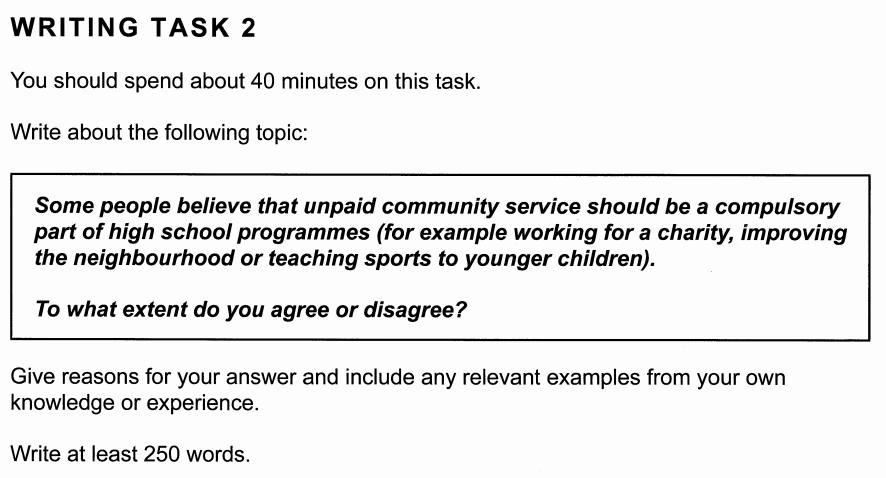Cambridge IELTS 9, TEST 2
The appropriate education methods have been discussed in academia for decades. It is said students should be involved in unpaid community services as a compulsory part of high school programmes. As a matter of fact, plenty of students, including undergraduate, participate in charities, community services and company internships before their graduations at present. For my point of view, I am totally agree with it.
By joining in some volunteer activities, students could be benefited from the processes during the serving, such as social relationships. Generally, those services provide the chance which can help the graduating students face to society in their earlier ages. Charities may teach students how to help the needy, and spread blesses without the form of money. Helping neighbours and guiding pupils are the effective way to enhance their sociability. On the other hand, more meaningful allocation of time schedules will be deployed during those programmes for each students. They could spend their times on helping others rather than staying at home with TV games or Internet chattings. It is a positive approach to drag them to outdoor activities, at least for their health.
Additionally, a compulsory school programmes could also share some youth problems. An earlier investigation in U.S. indicates that the juvenile crime rate was reduced from 11.6% to 6.3% around the year 2000, for the reason of compulsory labours. Fear, anxiety and loneliness are common problems for the youth who may feel rejected by society. But successful completion of community service can give young offenders a sense of accomplishment from doing things that benefit their communications, it can promote self-confidence and self-esteem in them as well. Those elements are the main contributions which help to reform them into responsible and productive members of society.
Overall, compulsory programmes for school students are the kernel factors to shape students' world views before they enter societies. It is challenging policies for government, but a win-win methods for both students and communities.
Unpaid Service for the Good of Community
The appropriate education methods have been discussed in academia for decades. It is said students should be involved in unpaid community services as a compulsory part of high school programmes. As a matter of fact, plenty of students, including undergraduate, participate in charities, community services and company internships before their graduations at present. For my point of view, I am totally agree with it.
By joining in some volunteer activities, students could be benefited from the processes during the serving, such as social relationships. Generally, those services provide the chance which can help the graduating students face to society in their earlier ages. Charities may teach students how to help the needy, and spread blesses without the form of money. Helping neighbours and guiding pupils are the effective way to enhance their sociability. On the other hand, more meaningful allocation of time schedules will be deployed during those programmes for each students. They could spend their times on helping others rather than staying at home with TV games or Internet chattings. It is a positive approach to drag them to outdoor activities, at least for their health.
Additionally, a compulsory school programmes could also share some youth problems. An earlier investigation in U.S. indicates that the juvenile crime rate was reduced from 11.6% to 6.3% around the year 2000, for the reason of compulsory labours. Fear, anxiety and loneliness are common problems for the youth who may feel rejected by society. But successful completion of community service can give young offenders a sense of accomplishment from doing things that benefit their communications, it can promote self-confidence and self-esteem in them as well. Those elements are the main contributions which help to reform them into responsible and productive members of society.
Overall, compulsory programmes for school students are the kernel factors to shape students' world views before they enter societies. It is challenging policies for government, but a win-win methods for both students and communities.

Writing Task 2
